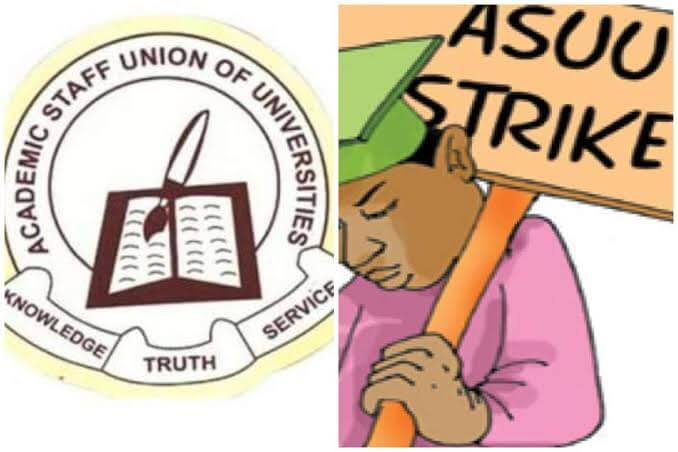ASUU dashes students’ hopes, declares indefinite strike

By Victor Akuma
The Academic Staff Union of Universities (ASUU) on Monday declared an indefinite strike.
Recall that had the academic body had on March 9 declared a two-week warning strike to protest federal government’s non-compliance with some of the agreements it reached with the union.
Among the issues raised by the union included FG’s non-implementation of the 2019 agreement it reached with the body.
Following the expiration of the two-week warning strike, the union had summoned an emergency National Executive Council (NEC) meeting to assess government’s response to the issues raised by the union.
Speaking after the meeting, ASUU president, Professor Biodum Ogunyemi, said the indefinite strike was consequent upon federal government’s failure to address the outstanding issues raised in the FGN-ASUU 2019 MoA.
He also noted FG’s refusal to see reason with its opposition against the Integrated Personnel and Payroll Information System (IPPIS) introduced by the government.
“It was difficult for NEC to take some painful decisions at its last meeting. Our wish was that government would satisfactorily address issues that gave rise to the warning strike which was billed to end today. However, we are not yet there as a country-a situation in which peaceful means, other than threats would be adopted to resolve industrial harmony.
“Nigerian government has elected to use hunger as a weapon of war against its academics and we are not going to sit and watch. Action and reaction, as they say, are equal but opposite. So based on the review of reports from ASUU leadership’s engagement with government, NEC concluded that government had failed to satisfactorily address the outstanding issues raised in the FGN-ASUU 2019 MoA and ignored the objections of ASUU against IPPIS.
“Consequently, NEC resolved to embark on a total, comprehensive and indefinite strike action beginning Monday, 23rd March, 2020 untill the issues are satisfactorily resolved.”
The ASUU boss stated it was unfortunate that the present administration, like successive ones, have continued to neglect the education sector despite its critical role in nation building.
He added: “Notable landmarks of those actions are the Memorandum of Understanding (MoU) 2013, Memorandum of Understanding (MoU) 2017 and Memorandum of Action (MoA) 2019. The point must be made that the various Memoranda all have their roots in the 2009 FGN-ASUU Agreement which was due for renegotiation way back in 2012.
“The federal government usually ignored ASUU’s calls for full implementation of agreements and Memoranda signed with the Union. Indeed, it is no news that successive governments in Nigeria have been treating matters of education, particularly university education with levity.”
On ways Nigeria can combat the spread of coronavirus, Ogunyemi said: “These measures, along with early detection and isolation, will significantly reduce the spread of the disease. We would like to use this opportunity to challenge investigatory agencies in the country to let Nigerians know why the isolation centres meant for the Ebola disease in 2014 are yet to be completed and put into use. A case in point is the Centre at the University of Abuja Teaching Hospital, Gwagwalada.
“It is good that governments are promoting “social distance” approach to reduce contact and movements. While addressing that, what we need now, more than ever before, is to address the infrastructural gap in healthcare delivery. There is also an urgent need to address the spread of the disease at the community level, where people take crowded.”

